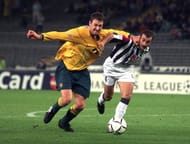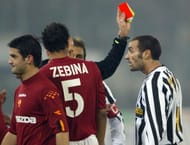The general consensus is that football is devoid of characters. Players are robotic, training machines and unable to truly reveal who they really are, if anything at all. Multi-millionaires, detached from society and no longer relatable to the common fan.
Turning up for work in a Ferrari is, of course, pretty distant from the life of the average supporter, so most can resonate with this outlook. Nowadays though, the characters are not obvious to spot off the pitch, but still manifest themselves on it. Diego Costa is a character, a fearsome competitor; Luis Suarez too. Personalities, fuelling our opinions and, depending on your allegiances, at times making our blood boil.
You wouldn’t get much from Costa socially over a pint, but his conduct on the pitch adds an unpredictable edge to the English Premier League. Similarly, Mario Balotelli does nothing of note on the pitch these days, however it’s difficult to remember what journalists used to write about before he returned to England. The proverbial pantomime villain.
Without personalities to get under our skin, Costa as our resident rule-bender, or Balotelli’s social media blunders, football would be an altogether more lifeless landscape. We need divisive figures, we need occasional divers, and we are all captivated in different ways from the odd handball that goes unpunished.
But, as players continue to ghost between what’s right and wrong, our emotional tolerance to players who dive, cheat or kick their way to victory has been somewhat diluted over time.
The reaction on Twitter to the more controversial incidents on the pitch reaffirm this view. Rewind 20 years and the more eccentric personalities of world football were more aggressive, increasingly spiteful and a far cry from the role models we expect now.
“This is the only true regret of my footballing career. It's all borne from my desire to be a winner”
Former Juventus and Uruguay defender Paulo Montero was a player who ignored the accepted boundaries, and consequently would have done well to survive the scrutiny afforded to professional footballers today.
He was once quoted as saying his desire to win far outweighed his wish to be seen as an example to others. “I'm not thinking about being a role model for my sons or for the fans watching me” is a choice quote from Montero unlikely to have gone down well today.
In 2003 he also openly admitted to crossing the line to win a football match, “I don't criticise those who tend to dive, because football is for smart people. And I am a defender, who comes up against cheating strikers every week.” Again, endorsing diving and saying he sees cheating as merely returning the favour are strong words unlikely to enamour himself to many nowadays.
“I don't think it is true to say that you are disloyal to football if you feign an injury, or tug a shirt or do something else to win the game as winning games is the purpose of football”
After starting his footballing career at Uruguayan club Penarol, he left for Europe in 1992. Signing for Atlanta, he subsequently secured a move to Juventus four years later. Making a total of 300 Serie A appearances in 13 card-littered years, he become known for his uncompromising style of play.
If ‘no-nonsense defender’ was a cliché pinned to only one player in Europe during the late-nineties and early-noughties, it would be Il Guerriero Solitario, The Lone Warrior.
An all-round central defender proficient technically as well as physically imposing, he possessed an unrivalled combative spirit. Montero was notorious for pushing his antics too far, renowned for not so much bending the rulebook but ripping out the pages and setting them ablaze.
The animosity towards him in the current era would have surely surpassed that aimed at fellow countryman Luis Suarez during his time at Liverpool, such was the tendency for trouble to follow him.
Returning to Uruguay, referees were glad to see the back of him. Holding the record for the highest number of Serie A red cards at 16, he was sent off an incredible 21 times in total throughout his career. It’s a number that looks beyond reach today.
Nearest rivals still plying their trade in Italy are Roma legend Francesco Totti and AC Milan midfielder Sulley Muntari, both five behind and unlikely to overcome such a target.
Averaging more than one sending off per season is an eye-watering statistic over a 10-year period, and you only have to look at his full array of misdemeanours to see why Montero often found himself on the wrong side of the referee.
From earth-shuddering two-footed tackles, to the vicious hacking away at an opponent’s stray leg, the sight of him putting his hands round the throat of an opponent is perhaps the final piece of evidence needed.
As an attacker lining up to face him you knew you were either being marked out the game, or kicked out of it instead. His philosophy being if the ball went past, in no uncertain terms the man wasn’t following. Even if the resultant skirmish meant the reward of another card, there wasn’t a chance you were running beyond unscathed.
“Sometimes you have to do anything to win and this is my nature”
One of Montero’s more infamous incidents came during an ugly exchange with Inter Milan midfielder Luigi Di Biagio. A hard man in his own right, retiring four Serie A red cards behind Montero, he was on the sharp end of an audacious sharp right jab whilst looking in the opposite direction. The referee missed it, but after a retrospective review he was given only a three-game ban.
Although not fully connecting, it demonstrated his willingness to push the boundaries of accepted conduct. You rarely see a closed fist thrown at an opponent’s jaw on a football pitch, and even during Montero’s era it was a shocking incident, however it was a prime example of his willingness to enter realms most would naturally avoid.
Montero’s father was part of Uruguay’s notoriously filthy team from the 1970s, so aggression was ingrained in the family DNA. Julio Montero Castillo represented Uruguay at two World Cups, closely witnessing Pele’s memorable performance in the 1970 semi-final. It was their World Cup side four years later that left a mark though, generally remembered as one of the dirtiest teams in football history.
Castillo’s son made 61 appearances for his country, going on to represent them in Japan and South Korea at the 2002 World Cup. Part of a talented group of players widely regarded as never fulfilling their promise at international level, they exited the tournament early and followed that up by failing to qualify four years later.
Achieving nothing of note with the national team irked Montero, however reflecting on his club career this would have gone some way to making up for it. Playing a huge part in the successful Marcello Lippi era at Juventus, he forged partnerships with some of Europe’s best defenders, including Lilian Thuram and Fabio Cannavaro.
His honours between 1996 and 2005 included five Serie A titles, three Italian Super Cups, an Intercontinental Cup, a UEFA Super Cup and an Intertoto Cup victory. The one medal achingly eluding Montero was the Champions League, as despite Juventus being one the best teams in Europe, they were beaten in the final on three separate occasions during his time at the club.
Losing two successive finals, to Borussia Dortmund in 1997 and Real Madrid in 1998, he waited five years to put it right before then missing a penalty in the shoot-out defeat to AC Milan in 2003. Juventus had battled to a 120-minute goalless draw at Old Trafford, only to see Milan goalkeeper Dida save Montero’s effort from the spot, leaving a permanent space in his medal collection.
“I was born a defender and I'll die a defender”
It was somewhat unfortunate for a player who lived and breathed competition that Montero never lifted Europe’s most coveted trophy. He often saved his strongest and most valiant performances for the Champions League, and Montero was such a key player in the preceding rounds the year of the Milan defeat they may have never even made it to the final in the first place if it wasn’t for him.
Montero was imperious in Juventus’ two-legged victory over Barcelona in the quarter-final. Despite having Edgar Davids sent off on 79 minutes, it took an epic effort to overcome the odds in extra-time. After a heroic rear-guard performance against the Catalan side, they triumphed 3-2 on aggregate.
He was also a prominent figure in their semi-final victory over Real Madrid, although during the second leg he was perhaps a tad fortunate he didn’t become the villain for his side. Facing a line-up including Zinedine Zidane, Luis Figo and Ronaldo, their bid to overturn a 2-1 first-leg deficit was going according to plan after opening up a two-goal lead at the Stadio delle Alpi. That was until Montero bought Ronaldo down for a second-half penalty. Although as the last man there was a strong case for another career red, he survived the referee’s decision. Juventus survived unscathed too, Buffon stopping Figo’s effort, thus securing Montero one last chance at Champions League glory.
The third final defeat was a career low for a centre-back fondly remembered in Turin. Not for his flair or goal-scoring displays, but for doing whatever was necessary for the cause, even if that meant breaking the rules to gain an advantage.
It was his fighting nature that helped Montero earn his place alongside the long line of legendary players to grace the colours of Juventus. He may not have set out to be an example to others, inadvertently by being a born winner who took no prisoners he still ended up being labelled one.
To any player lucky enough to wear the famous black and white, they have those who achieved so much before them as a barometer to measure any eventual success. Montero, with his often ugly punching, kicking and cold-hearted aggression, remains one of the more controversial. An example to many, an enemy to most too. A winner, though, at all costs.


